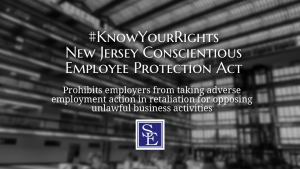The New Jersey Supreme Court recently provided further clarification on what an employee must ‘know’ to be able to sustain a claim against their employer under the New Jersey whistleblower protection law, the Conscientious Employee Protection Act (CEPA). In July 2019, the court issued its opinion in the case Chiofalo v. State, finding that an employee’s whistleblower retaliation claim should not necessarily be dismissed because the employee did not identify the specific law that the employee believed their employer to have been violating. The court held that, where an employee held a reasonable belief that complained of conduct was criminal or fraudulent, that is enough to come within the broad remedial scope of the CEPA whistleblower protection statute.

The plaintiff in that case, Frank Chiofalo, was a Sergeant with the State Police when he allegedly refused to participate in activity that he alleged be believed to be criminal or fraudulent. Specifically, Sgt. Chiofalo alleged that he was directed by a supervisor to destroy a record from a fellow officer’s personnel file. The record in question was a “letter of appreciation” that memorialized a police escort that was provided to a civilian. This record was potentially damaging, as the escort in question was not officially sanctioned, violated policy, and led to an internal review by the State Police. Sgt. Chiofalo alleged that because he refused to destroy this record to protect the other officer, he was subjected to discipline when he was demoted and denied a promotion. Sgt. Chiofalo then filed suit, claiming that his rights were violated under the CEPA whistleblower protection law.
The Appellate Division found that Sgt. Chiofalo’s CEPA claim had to be dismissed because he had failed to specifically identify a statute, regulation, or public policy that the conduct he complained of was or would have been in violation of. The New Jersey Supreme Court disagreed and reversed that aspect of the decision. The Court agreed with the Appellate Division that the plaintiff must have had a reasonable belief that the complained of conduct violated the law, that reasonable belief did not have to be specific or particularized. The Court reiterated language from prior precedent “that [courts] do not expect whistleblower employees to be lawyers on the spot.” Rather, they can rely on their perception and later, with the assistance of counsel, identify the specific statute, regulation, or public policy that the conduct was in violation of.
 New Jersey Employment Lawyers Blog
New Jersey Employment Lawyers Blog

